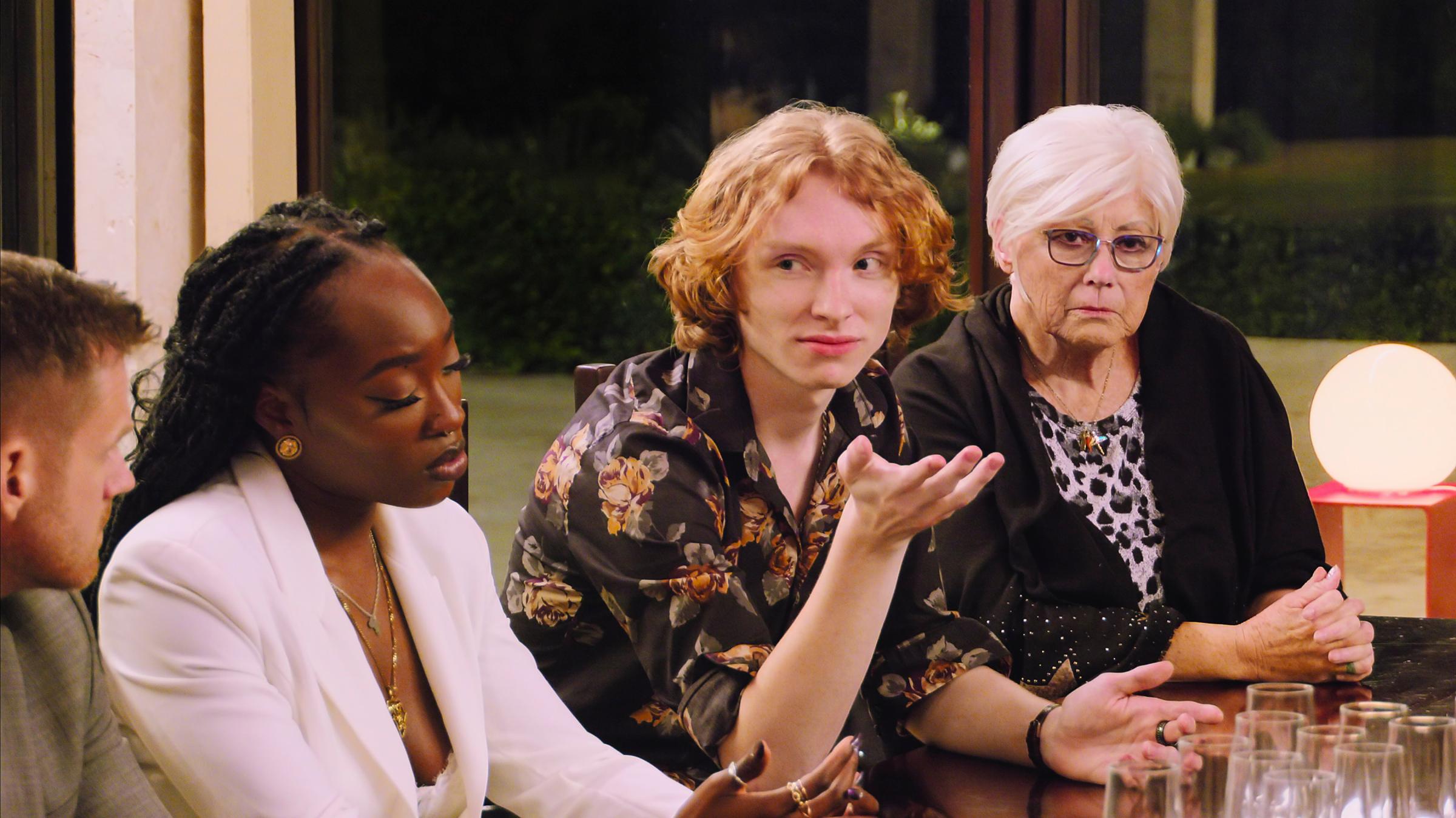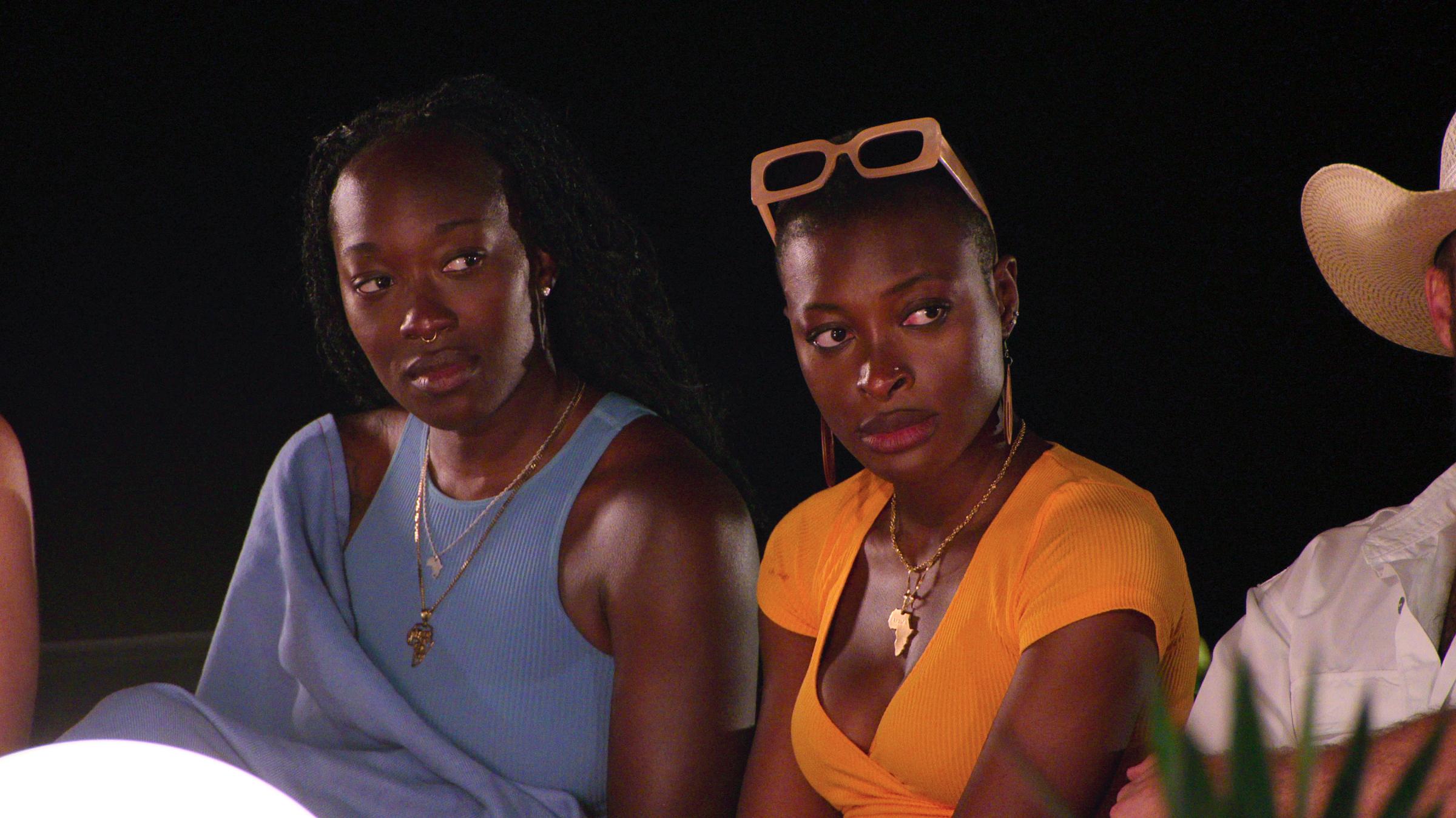This article discusses, in detail, the finale of The Trust.
A generation after Survivor’s debut, a reality competition boom is once again upon us. Days before Peacock premiered the second season of its breakout murder-mystery hit The Traitors, Netflix unveiled a similarly paranoia-fueled social game titled The Trust. As in The Traitors, cast members can only win the grand prize by correctly discerning which players they can trust—and eliminating those who might betray them. Yet because it has no artificial whodunit structure, The Trust has become a more personal and political show, revealing, for better or worse, the disparate worldviews, prejudices, and other baggage the contestants bring into it. In that regard, the exercise is a whole lot messier than Wednesday’s feel-good finale led viewers to believe.
The game is simple: 11 strangers living together in a luxurious seaside villa have access to a $250,000 pot. They can either share it equally or, periodically, opt to vote each other off the show, thus securing a larger portion of the cash. Whoever gets the most votes is eliminated, even if only one person decides to cast a vote—a wrinkle that, in turn, incentivizes people to vote as a means of self-defense. Meanwhile, group challenges and private offers allow players to augment the prize fund and siphon off some of it for themselves, respectively.
Subtitled A Game of Greed, The Trust is more accurately a game of reading people. Each contestant must not only judge their peers’ trustworthiness, but also gauge how trustworthy each of the others is likely to deem them. That’s an especially fraught task when the cast is a typical reality TV mélange, spanning generations, classes, racial and gender identities. Players who urgently need the prize money might vote out a wealthy opponent without a second thought. Those who’ve experienced systemic discrimination and bigotry might be inclined to play a more defensive game than those who believe they’ve gotten a fair shake in life.

This is, in fact, what happens: empirically justifiable pessimism becomes a self-fulfilling prophecy. The cast splits, early on, into male and female factions. Among the men, the de facto leaders are Jake, a confident and self-righteous military contractor, and Brian, a rancher and family man whose combination of beardy gruffness and tender heart bring to mind a real-life Nick Offerman character. At the helm for the women are Winnie, a bartender who isn’t shy about playing to win, and Tolú, a marketing manager who’s driven to help her immigrant parents.
Winnie and Tolú are Black. Jake and Brian are white. Winnie and Tolú come in eager to form alliances and eliminate potential threats. (Their first target, Juelz, gives them reason to believe he has it out for Tolú.) “At the end of the day I’m here for No. 1,” says Tolú. Jake and Brian espouse all sorts of high-minded ideals, insisting that the contestants can become one big, happy family where everyone gets along and shares the prize money equally. Brian believes that “money is a poison” and is striving to be better than a father whose greed led him to steal.
But the men’s behavior can sometimes undermine the women’s trust. In an early episode, Tolú, whose family comes from Nigeria, has to gently request that Jake stop bringing up her Africanness, even if he is trying to be complimentary. “When we’re connecting with individuals from different cultures and different experiences and different backgrounds, we can’t forget to look at them as individuals,” she tells him. Jake takes the criticism in stride, and the conversation ends in a hug. Tolú seems genuinely moved by his humility. Still, it must be hard to place your trust in someone who has to be asked to stop treating you like an exotic other.

The first elimination that feels fully purposeful happens after Bryce, a bubbly white realtor who is the scion of a real-estate dynasty, confesses to his castmates that he is already a millionaire at age 22—and that he lied about his wealth earlier in the show. Although he’s gotten close to many of the women in the house, it’s their contingent that mobilizes to vote him out. The men are aghast; after all, Bryce comes off as perhaps the sweetest person in the house. You could ask which is the bigger betrayal: Bryce’s lie or the women’s vote. But beyond the social context, there’s the more salient question of whether money that could go to someone living paycheck to paycheck should be allocated to someone wearing a watch that costs six figures. “Life isn’t fair outside of here, and it’s not equal,” says Julie, an entrepreneur who grew up in poverty. “I don’t think this idea of selfishness is as black and white as a lot of the group makes it seem.”
Bryce’s elimination moves the men to start voting. The first person they identify as a threat is Winnie. According to Gaspare, a teacher who is part of Jake and Brian’s circle of trust: “Winnie is calling the shots, Winnie is the puppetmaster. We believe that Winnie is the reason that Bryce got sent home. So if you’ll cut out your own friend, what will you do to your enemies?” At the same time, Julie, who’s slowly forming a romantic bond with Jake, starts to waver in her loyalty to the women. And as the tide starts to turn against them, another member of their alliance, business coach Lindsay, tries to play both sides. She’s convinced that Winnie and Tolú are only really looking out for each other and will eventually throw the other women under the bus. Who can say why Lindsay, who is white, believes that these two Black women won’t have her back?

Winnie becomes the first player that the men find sufficiently threatening to vote out. Once she’s gone, Tolú is isolated in the house. The men, with their new ally Lindsay, are poised to eliminate her right before the finale. But then it comes out that Lindsay misrepresented some of her votes to Brian, Jake, and Gaspare; she also has a bizarre meltdown, in which she calls all three guys “idiots.” These developments cause Gaspare to vote for Lindsay, while the other men and Julie abstain. Tolú, who also voted for Lindsay (and vice versa), is saved at the last minute.
But she still has to save herself from the final elimination. Everyone needs to convince their castmates that they won’t be the person to ruin a five-way tie that could yield around $50k per player. Tolú spends the finale trying to make amends with her former adversaries—and she succeeds. She also elects to share the money. Cue the happily-ever-after Champagne toast. Jake and Julie are looking ahead to a future together. Brian announces that his winnings will help his family adopt a baby. “There are truly genuine people in this world,” Tolú gushes. “You do not have to live your life feeling like you have to be on guard or on edge every single day.”
It’s supposed to be an inspirational moment. Sure, more than half the cast had to be eliminated, but five people who couldn’t be more different learned to trust and share. Yet some aspects of the show’s ending don’t seem so tidy. For one thing, before the vote, Tolú is nervous enough about getting cut that she accepts a side offer to skim $25k off the top of the prize pool and, as far as we know, never confesses to her castmates what she did. (As she points out, this is her first chance to make such a deal, and even saintly Brian has already lucked into winning $30k this way.) “I’m the last hope for my family, and I’ve got to think about my parents,” she says.

The Trust is edited to ensure that viewers come out believing, like Brian and Jake, in a meritocracy where every individual comes in—to a reality show or, presumably, to life—as an equal and goes away with the reward they’ve earned solely through their actions. Tolú could not have made it through the finale without appearing to come around to this worldview, even though there’s a strong case to be made that she had to overcome the additional, unconscious biases of her peers. After all, by the end, she was in a minority of one, and, as she tried to tell Winnie shortly before the latter’s elimination, that meant she had to play by the majority’s rules.
If Tolú’s reasoning for taking the deal is any indication, the competition didn’t actually do much to shift her perspective, which prioritized her obligation to her family over her connection with 10 people she’d just met. Nor should it necessarily have. Many of her castmates preferred to play a game abstracted from the real world, where no one could see color and a sweetheart Gen Z millionaire could deserve $50k more than a person playing a strategic game who didn’t earn that much in a year. Tolú never departed from reality, and now she has an extra $25k to show for it. Well played.
More Must-Reads from TIME
- Donald Trump Is TIME's 2024 Person of the Year
- Why We Chose Trump as Person of the Year
- Is Intermittent Fasting Good or Bad for You?
- The 100 Must-Read Books of 2024
- The 20 Best Christmas TV Episodes
- Column: If Optimism Feels Ridiculous Now, Try Hope
- The Future of Climate Action Is Trade Policy
- Merle Bombardieri Is Helping People Make the Baby Decision
Contact us at letters@time.com